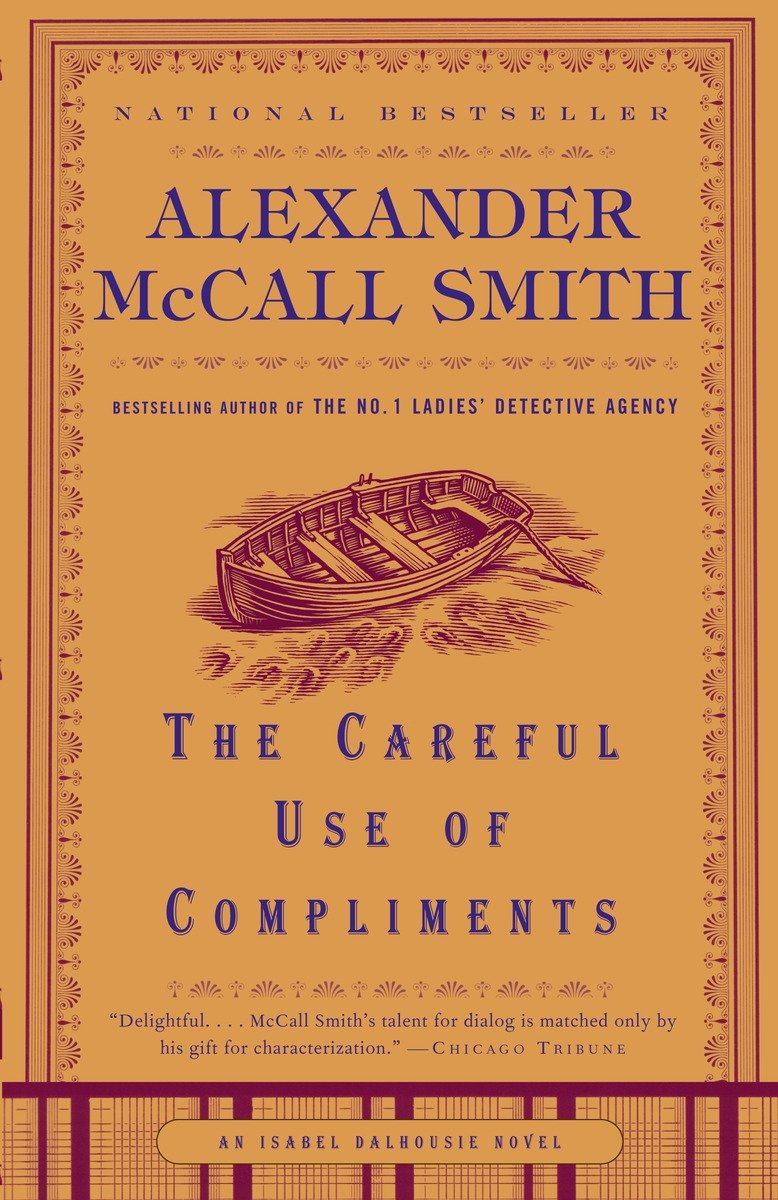The Careful Use of Compliments: Book 4
16.00 JOD
Please allow 2 – 5 weeks for delivery of this item
Description
Full-time philosopher and occasional sleuth Isabel Dalhousie, now the mother of a baby boy, is getting used to the new rhythms of her life, caring for little Charlie with the sometimes unsettling aid of her forthright housekeeper, Grace, having dinners with Charlie’s father, Jamie, and tending as usual to submissions to the Review of Applied Ethics. But Isabel is deeply unsettled when she receives a letter telling her that she is soon to be replaced as editor of the Review by Christopher Dove, an ambitious academic at a London university, and she considers a variety of ways of dealing with this unwelcome news. And her niece, Cat, who a couple of years before had rejected Jamie and broken his heart, is now furious at Isabel for having stolen him away.Isabel’s insatiable curiosity—or what Jamie sees as her tendency toward meddling—is peaked when she learns some odd details regarding two paintings by a Scottish artist that have come onto the auction market, and she begins to think that the paintings might be forgeries. Her investigation takes her to the beautiful Isle of Jura, where she finds some recent traces of the painter and learns of his apparent suicide in the fabled whirlpool called the Corryvreckan. A visit to the painter’s widow brings a surprising realization, one that contributes to her musings throughout the story on mothers, fathers, and sons.
Additional information
| Weight | 0.29 kg |
|---|---|
| Dimensions | 1.99 × 13.16 × 20.32 cm |
| PubliCanadanadation City/Country | Canada |
| by | |
| Format | Paperback |
| Language | |
| Pages | 272 |
| Publisher | |
| Year Published | 2008-9-2 |
| Imprint | |
| ISBN 10 | 0676976689 |
| About The Author | ALEXANDER MCCALL SMITH is the author of the international phenomenon The No. 1 Ladies' Detective Agency series, the Isabel Dalhousie Series, the Portuguese Irregular Verbs series, the 44 Scotland Street series and the Corduroy Mansions series. He is professor emeritus of medical law at the University of Edinburgh in Scotland and has served with many national and international organizations concerned with bioethics. He was born in what is now known as Zimbabwe and was a law professor at the University of Botswana. |
“No one does understated wit like Alexander McCall Smith…. Alexander McCall Smith’s books have won their loyal followers for fine writing, not easily summarized plots… Neither this novel nor its philosophically minded heroine is particularly sexy. But they are eminently loveable.” The Globe and Mail “In this fourth installment in his ‘Sunday Philosophy Club’ series, Alexander McCall Smith offers a pleasant and satisfying read, perfectly suited to an afternoon curled up by a fire with a good pot of tea…. The book charms and delights as it meanders through Isabel’s struggles, her job as editor of an obscure ethics journal and the triumphs and pleasures of a life well lived.” The Guelph Mercury |
|
| Excerpt From Book | Chapter OneTake one hundred people,” said Isabel.Jamie nodded. “One hundred.”“Now, out of those one hundred,” Isabel continued, “how many will mean well?”It was typical of the sort of trying question Isabel asked herself, in the way in which we sometimes ask ourselves questions that admit of no definitive answer. She was an optimist when it came to humankind, unfashionably so, and so she thought the answer was ninety-eight, possibly even ninety-nine. Jamie, the realist, after a few moments’ thought, said eighty.But this was not a question which could be disposed of so easily; it raised in its wake other, more troubling questions. Were those one or two people the way they were because of the throw of the genetic dice—a matter of patterns and repeats deep in the chemistry of their DNA—or was it something that went wrong for them a long time ago, in some dark room of childhood, and stayed wrong? Of course there was quite another possibility: they chose. She was sitting in a delicatessen when she remembered this conversation with Jamie. Now, from that convenient vantage point, she looked out of the window—that man who was crossing the road right then, for example; the one with the thin mouth, the impatient manner, and the buttoned collar, was perhaps one of that tiny minority of the malevolent. There was something about him, she felt, that made one uneasy; something in his eyes which suggested ruthlessness, a man who would not wait for others, who did not care, who would suffer from road rage even while walking . . . She smiled at the thought. But there was certainly something unsettling in his demeanour, a hint of poisoned sexuality about him, she felt; a whiff of cruelty, something not quite right.She looked away; one did not want such a person to see one staring; nor, she reminded herself, did she want to catch herself engaging in such idle speculation. Imagining things about perfect strangers might seem a harmless enough pursuit, but it could lead to all sorts of ridiculous fantasies and fears. And Isabel was aware that of all her manifold failings, thinking too much about things was one of the most egregious.Of course a delicatessen in Edinburgh was not the most obvious place to entertain such thoughts on the nature of good and evil, but Isabel was a philosopher and knew full well that philosophical speculation came upon one in the strangest places and at the strangest times. The delicatessen was owned by her niece, Cat, and in addition to selling the usual things that such shops sold—the sun-dried tomatoes and mozzarella cheese, the fresh anchovy fillets and the small bars of Austrian marzipan—this delicatessen served coffee at the three or four small marble-topped tables that Cat had found on a trip to the Upper Loire valley and that she had carted back to Scotland in a hired self-drive van.Isabel was sitting at one of these tables, a freshly made cappuccino before her, a copy of that morning’s Scotsman newspaper open at the crossword page. Her coffee had been made by Cat’s assistant, Eddie, a shy young man to whom something terrible and unexplained had happened some time ago and who was still awkward in his dealings with Isabel and with others. Eddie had gained in confidence recently, especially since he had taken up with a young Australian woman who had taken a job for a few months in the delicatessen, but he still blushed unexpectedly and would end a conversation with a murmur and a turning away of the head.“You’re by yourself,” said Eddie, as he brought Isabel’s coffee to her table. “Where’s the . . .” He trailed off.Isabel smiled at him encouragingly. “The baby? He’s called Charlie, by the way.”Eddie nodded, glancing in the direction of Cat’s office at the back of the delicatessen. “Yes, of course, Charlie. How old is he now?”“Three months. More or less exactly.”Eddie absorbed this information. “So he can’t say anything yet?”Isabel began to smile, but stopped herself; Eddie could be easily discouraged. “They don’t say anything until they’re quite a bit older, Eddie. A year or so. Then they never stop. He gurgles, though. A strange sound that means I’m perfectly happy with the world. Or that’s the way I understand it.”“I’d like to see him sometime,” said Eddie vaguely. “But I think that . . .” He left the sentence unfinished, yet Isabel knew what he meant.“Yes,” she said, glancing in the direction of Cat’s door. “Well, that is a bit complicated, as you probably know.”Eddie moved away. A customer had entered the shop and was peering at the counter display of antipasti; he needed to return to his duties.Isabel sighed. She could have brought Charlie with her, but she had decided against it, leaving him instead at the house with her housekeeper, Grace. She often brought him to Bruntsfield, wheeling him, a wrapped-up cocoon, in his baby buggy, negotiating the edge of the pavement with care, proud in the way of a new mother, almost surprised that here she was, Isabel Dalhousie, with her own child, her son. But on these occasions she did not go into Cat’s delicatessen, because she knew that Cat was still uncomfortable about Charlie.Cat had forgiven Isabel for Jamie. When it had first become apparent that Isabel was having an affair with him, Cat had been incredulous: “Him? My ex-boyfriend? You?” Surprise had been followed by anger, expressed in breathless staccato: “I’m sorry. I can’t. I just can’t get used to it. The idea.”There had been acceptance, later, and reconciliation, but by that stage Isabel had announced her pregnancy and Cat had retreated in a mixture of resentment and embarrassment.“You disapprove,” said Isabel. “Obviously.”Cat had looked at her with an expression that Isabel found impossible to interpret.“I know he was your boyfriend,” Isabel continued. “But you did get rid of him. And I didn’t set out to become pregnant. Believe me, I didn’t. But now that I am, well, why shouldn’t I have a child?”Cat said nothing, and Isabel realised that what she was witnessing was pure envy; unspoken, inexpressible. Envy makes us hate what we ourselves want, she reminded herself. We hate it because we can’t have it.By the time that Charlie arrived, tumbling—or so it felt to Isabel—into the world under the bright lights of the Royal Infirmary, Cat was talking to Isabel again. But she did not show much warmth towards Charlie; she did not offer to hold him or to kiss him, although he was her cousin. Isabel was hurt by this, but decided that the best thing to do was not to flaunt Charlie before her niece, but allow her to come round in her own time.“You can’t carry on disliking a baby for long,” said Grace, who, imbued with folk wisdom, was often right about these things. “Babies have a way of dealing with indifference. Give Cat time.”Time. She looked at her watch. She had put Charlie down for his nap almost two hours ago and he would be waking up shortly. He would want feeding then, and although Grace could cope with that, Isabel liked to do it herself. She had stopped breast-feeding him only a few days after his birth, which had made her feel bad, but the discomfort had been too great and she had found herself dreading the experience. That was not a way to bond with one’s child, she thought; babies can pick up the physical tension in the mother, the drawing back from contact. So she had switched to a baby formula.Isabel would not leave the delicatessen without exchanging a few words with Cat, no matter how strained relations might be. Now she rose from her table and made her way to the half-open door to the office. Eddie, standing at the counter, glanced briefly in her direction and then looked away again.“Are you busy?”Cat had a brochure in front of her, her pen poised above what looked like a picture of a jar of honey.“Do people buy lots of honey?” Isabel asked. It was a banal question—of course people bought honey—but she needed something to break the ice.Cat nodded. “They do,” she said, distantly. “Do you want some? I’ve got a sample somewhere here. They sent me a jar of heather honey from the Borders.”“Grace would,” said Isabel. “She eats a lot of honey.”There was a silence. Cat stared at the photograph of the jar of honey. Isabel drew in her breath; this could not be allowed to go on. Cat might come round in the end—and Isabel knew that she would—but it could take months; months of tension and silences.“Look, Cat,” she said, “I don’t think that we should let this go on much longer. You’re freezing me out, you know.”Cat continued to stare fixedly at the honey. “I don’t know what you mean,” she said.“But you do,” said Isabel. “Of course you know what I mean. And all that I’m saying is that it’s ridiculous. You have to forgive me. You have to forgive me for having Charlie. For Jamie. For everything.”She was not sure why she should be asking her niece’s forgiveness, but she was. When it came to forgiveness, of course, it did not matter whether somebody was wronged or not— what counted was whether they felt wronged. That was quite different.“I don’t have to forgive you,” said Cat. “You haven’t done anything wrong, have you? All you’ve done is have a baby. By my . . .” She trailed off.Isabel was astonished. “By your what?” she asked. “Your boyfriend? Is that what you’re saying?”Cat rose to her feet. “Let’s not fight,” she said flatly. “Let’s just forget it.” |
| Series |
Only logged in customers who have purchased this product may leave a review.






Reviews
There are no reviews yet.